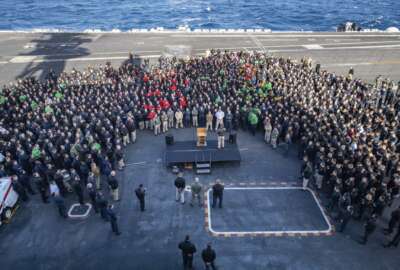
Meltdown when leaders lose their cool
Acting Navy Secretary Tom Modly did 180-degree opposite of wise leadership at a crucial moment.
The first rule of leadership: You’ve got no throw-away lines.
Now-former-acting Navy Secretary Thomas Modly learned it the hard way. He violated the most basic tenet of leadership in a manner so astonishing, it cost him the job — and his prestige. Navy secretary isn’t just a job, either. It’s a distinguished office with weight and history, with national importance.
It wasn’t the firing of a well-liked officer that got Modly into trouble, even as it got him into controversy. The dismissal of Capt. Brett Crozier hardly amounted to, say, President Harry Truman firing Gen. Douglas MacArthur. But it is part of a long tradition of civilian oversight of military affairs that can occasionally turn tense.
Modly felt he had reason to doubt Crozier’s command, and took action. But that’s where his sense of leadership failed. Truman explained his policy towards the Korean Peninsula, and let listeners hear for themselves why MacArthur had to go. Truman probably had a lot of salty things to say about MacArthur, but he didn’t say them in speeches.
What made Modly have to quit was his intemperate comments about Crozier, right on the very aircraft carrier from which Crozier was removed. He used profanity and referred to Crozier as naive and stupid. In the ensuing uproar, Modly publicly apologized to Crozier, ” … for any pain my remarks may have caused.” Not for the lapse in judgment in saying those words in the first place.
You might have said, well, what does Modly know about the Navy? Has the guy ever even been on a ship? Modly in fact is a Naval Academy graduate, flew helicopters, served as an officer for several years, and taught at the Air Force Academy. His initial decision to remove Crozier is arguably supportable. His subsequent action is simply unbecoming of a secretary.
The coronavirus put the USS Theodore Roosevelt in uncharted waters, so to speak. The bug essentially disabled a linchpin of American power projection just as surely as a torpedo might have. No doubt US enemies are taking note.
In his remarks aboard the Roosevelt, Modly said he’d asked Crozier earlier, before the leaked memo, if he could visit, and what other help the captain needed. “He [Crozier] waved me off,” Modly said, and that Crozier had indicated things were under control. Then the memo appeared in the San Francisco Chronicle.
Modly said he felt Crozier had revealed “sensitive information about the material condition of a Naval warship.” If he’d stopped there, Modly still might not have received bouquets from the sailors he was addressing, but at least would have made a reasoned case and stuck to the issues.
But then Modly continued with the personal “naive or stupid” remarks about Crozier. It went downhill from there. “The alternative is, he did it on purpose,” Modly added, thereby questioning Crozier’s motivation. He called Crozier’s actions “a betrayal.”
Modly went on to lecture, scold, and berate the crew, too. You cannot only hear the speech but also see and hear the crew reactions, some of them unprintable, at this Task and Purpose posting.
So, Modly’s game was over the moment he set leather sole on deckplate.
Don’t doubt the seriousness of the ship’s situation for the lives of the sailors and for the national security of the country. It added to the severe strain under which the whole nation and its government are operating. That’s precisely why we look to top leadership to have level heads.
Streets in Washington, D.C., are named for men who held that office. Some modern-day men with exemplary public service records have also held it. Sean O’Keefe, Richard Danzig, and Gordon England come to mind. Susan Livingstone, the first woman, was acting Navy Secretary briefly in the George W. Bush administration after a consequential stint as undersecretary. Service secretaries, over all, have ranged from the likes of the future President Theodore Roosevelt to borderline hacks. That’s our system.
Capt. Crozier’s fevered complaint went public, rightly or wrongly. Violation of the Uniform Code of Military Justice or just an unfortunate leak about a necessary request? People will debate both men’s actions for a long time. But what isn’t debatable is that Modly, Crozier’s superior — at a heated moment requiring calm, reasoned leadership — lost his cool.
Copyright © 2025 Federal News Network. All rights reserved. This website is not intended for users located within the European Economic Area.
Tom Temin is host of the Federal Drive and has been providing insight on federal technology and management issues for more than 30 years.
Follow @tteminWFED






